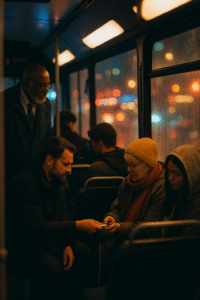
It was past nine when the bus groaned, sighed, and quit. The lights flickered; the heater coughed a final warm breath and went still. Outside, the city shimmered—close enough to see, too far to walk.
Silence introduced us. The driver apologized; dispatch was sending a replacement “soon.” A teenager in a hoodie offered his portable charger to a woman whose phone was at 2%. An older man folded his scarf in half and handed it to a shivering student. Someone cracked a joke about our “exclusive after-hours tour.” We laughed—the kind that lifts a heavy room an inch.
Twenty minutes stretched to forty. The driver made rounds, checking on everyone. A mother hummed to a sleepy child. A nurse on her way to a night shift called the ward: “Running late, but I’ll be there.” She said it calmly, as if late could be kind if you talked to it gently.
When the replacement bus finally arrived, no one rushed. We filed out like old friends after a long dinner, nodding thanks to the driver who had kept us informed and to each other for the small, practical gifts—a charger, a scarf, a story. I didn’t learn anyone’s name. I didn’t need to. The night felt warmer on the second bus, not because the heater worked but because kindness did.




